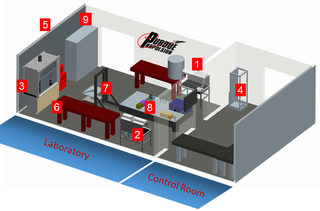Lab Capabilities
Hypergolic Propellant Handling
- The hypergolics propellant laboratory is a dedicated facility for propellant development and fundamental combustion research
- Dedicated ventilation system maintains lower pressure in lab than the control room
- Three fume hoods allow for safe, separate storage and study of fuels and oxidizers as well as larger experiments
- Positive pressure suits, PPE, and room and personal sensors allow safe experiments with harmful chemicals
- Capability for personnel to operate equipment remotely from the control room
ROSS 2000 Streak Camera System
- The ROSS 2000 streak camera is an ultrahigh-speed spectroscopic detector capable of:
- Spectral imaging encompassing the UV and Visible ranges from 200-900 nm
- Spectroscopic measurement at time scales applicable to hypergolic reactions
- Sweeps over durations of 300 ns to 30 ms with a temporal resolution < 40 ps
- Simultaneous measurements over a maximum of 180 nm wavelength range
Agilent Cary 680 FTIR Spectrometer
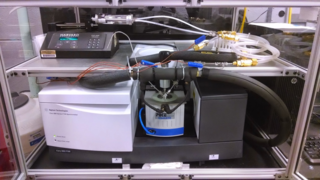
Agilent Cary 680 FTIR system with gladiATR and flow through system installed (Click image for details).
- The Agilent Cary 680 FTIR spectrometer is capable of Fourier transform infrared spectroscopy (FTIR) of condensed and gas phase samples
- Spectral range from 9,000-350 cm-1
- ~110 spectra/second at 16 cm-1 resolution for kinetics experiments
- Ventilated enclosure allows experiments with toxic materials
- Pike GladiATR accessory
- Diamond crystal internal reflection element enables study of corrosive condensed phase samples
- Temperature conditioned (-40 to 100°C) ATR crystal plate
- Liquid flow through attachment for reaction monitoring
Lambda EZ 301 Spectrometer
- The Lambda EZ 301 Spectrometer is designed for UV/Visible spectroscopic analyses of liquid, solid, and gaseous samples
- Absorption/transmission measurements over a specific wavelength region:
- Grating sweep speed up to 3600 nm/min
- 1100 to 190 nm in ~30 seconds
- Wavelengths can be scanned repeatedly to evaluate changes with respect to time
- Can additionally record absorbance or transmittance at a given wavelength as a function of time
LabRAM Resodyn Mixer
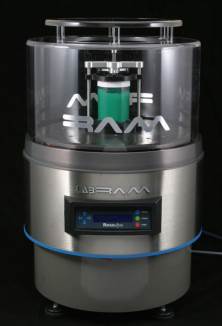
- The LabRAM Resodyn mixer uses acoustics for rapid and uniform mixing:
- Consistent, complete mixing across batches without contamination of external mixing paddles
- Enclosed mixing containers enable mixing toxic materials with minimal exposure risk
- Rapid mixing in a variety of containers with a 500 g capacity
- Mixes gases, liquids, solids, powders, pellets, viscous liquids, and pastes
Eppendorf 5810R Centrifuge
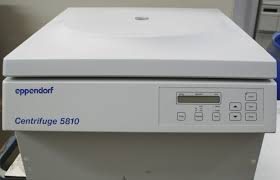
- The Eppendorf 5810R Centrifuge allows for the study of particle stability
- Configurable swing bucket rotors provide up to 4 x 750 mL capacity
- Maximum speed of 14,000 rpm imparts over 10,000g's to samples
- Temperature conditioned (-9 to 40°C) sample compartment
Hypergolic Droplet Characterization
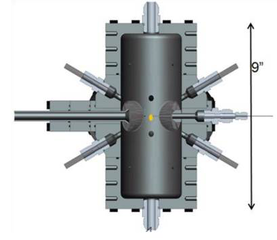
- Configurable for single droplet or droplet impact studies
- Controlled environment:
- Optical accessibility to allow for multiple diagnostic techniques
- Variable pressure up to 10 atm
- Variable temperature up to 450 K
- Variable chamber gas composition
- Impact velocities up to 10 m/s
Impinging Jet System

- Variable chamber pressure, temperature, and gas composition
- Configurable and repeatable injection conditions
- Variable O/F, momentum ratio, injection duration
- Linear actuators provide ~3 ms to steady state commanded injection conditions
- Programmable pulsed mode operation capability
- Two combustion chamber configurations
- 360° optically accessible, atmospheric pressure, fused silica chamber
- 250 psia elevated pressure combustion chamber with high frequency pressure measurement
- Measured results: Ignition delay and combustion efficiency
Laser Diagnostics

- Planar Laser Induced Fluorescence (PLIF) imaging of the OH radical at up to 5 kHz
- High frequency 3-D imaging with rotating mirror
- Measurements on hypergolic droplet characterization and impinging jet systems
Rheometer

- Rheometer allows for characterization of Non-Newtonian propellants
- System designed for safe experimentation with toxic propellants
- Remote operation at driving pressures up to 3000 psia
- Controllable shear rate up to 106 1/s
- Measured results: Propellant viscosity, storage/loss modulus, yield stress
